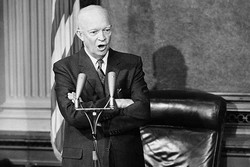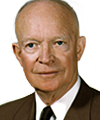Dwight Eisenhower Speech
|
| updated |
Copy Link Code
|
 Although Dwight Eisenhower had a distinguished military career commanding troops and served two terms as president, he never warmed to the idea of public appearances and making speeches. Given his vast military experience and continuous fight for world peace, however, Dwight Eisenhower had much to say, often with common sense approaches to problems and with wise words. Below is a synopsis of his three best speeches.
Although Dwight Eisenhower had a distinguished military career commanding troops and served two terms as president, he never warmed to the idea of public appearances and making speeches. Given his vast military experience and continuous fight for world peace, however, Dwight Eisenhower had much to say, often with common sense approaches to problems and with wise words. Below is a synopsis of his three best speeches.
- The Chance for Peace Speech: On April 16, 1953, following the death of the Soviet dictator Joseph Stalin, President Dwight D. Eisenhower spoke to the American Society of Newspaper Editors about peace. In this "Chance for Peace Speech," the president outlined the cost of war as it related to what was being taken away from the American people who bore the cost of it. Here is the most important and most recognized part of this speech:
Every gun that is made, every warship launched, every rocket fired signifies, in the final sense, a theft from those who hunger and are not fed, those who are cold and are not clothed. This world in arms is not spending money alone.It is spending the sweat of its laborers, the genius of its scientists, the hopes of its children.
The cost of one modern heavy bomber is this: a modern brick school in more than 30 cities.
It is two electric power plants, each serving a town of 60,000 population.
It is two fine, fully equipped hospitals. It is some 50 miles of concrete highway.
We pay for a single fighter plane with a half million bushels of wheat.
We pay for a single destroyer with new homes that could have housed more than 8,000 people.
This, I repeat, is the best way of life to be found on the road the world has been taking.
This is not a way of life at all, in any true sense. Under the cloud of threatening war, it is humanity hanging from a cross of iron.
- The D-day Speech (sometimes called The Order of the Day): Delivered on June 6, 1944, the D-day speech was a call to arms delivered by General Dwight D. Eisenhower as he supervised the launching of a flotilla consisting of 176,000 men, 20,000 vehicles and tons of supplies. The armada was leaving England moving toward Normandy, France. In his Order of the Day, Eisenhower spoke in a spiritual vocabulary calling the movement "The Great Crusade," and telling his troops: "The eyes of the world are upon you. The hopes and prayers of liberty loving people everywhere march with you." He told them they would be responsible for ending the "Nazi war machine" ending the oppression of the people of Europe and establishing a free world everywhere. He ended the speech by saying: "I have full confidence in your courage, devotion to duty and skill in battle. We will accept nothing less than full victory! Good Luck! And let us all beseech the blessings of Almighty God upon this great and noble undertaking."
- The Farewell Address: During his first term as president, Dwight Eisenhower was successful in securing an armistice to halt the Korean War after three years of fighting. In his position as Commander-in-Chief, he was instrumental in expanding the military of the U.S. in order to prevent any aggression by the U.S.S.R., always with the intent of staying a step ahead of them Soviets in technology. However, in his Farewell Address, Eisenhower offers caution about the new "military industrial complex" of Congress, the military and the industrial supplies that supplied the goods to the military, saying, "The potential for the disastrous rise of misplaced power exists and will persist. We must never let the weight of this combination endanger our liberties or democratic process."
